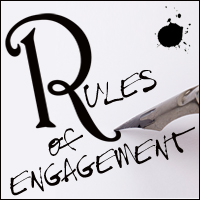.
 A notebook for fiction writers and aspiring novelists. An editor’s perspective.
A notebook for fiction writers and aspiring novelists. An editor’s perspective.
• Next post • Previous post • Index
It’s all about the drama, dahlings.
Books and blogs about “plotting a novel” are as ubiquitous as leaves on a summer tree. I suspect some of these efforts are actually very good. Others? Not so much. That being said, let me cut to the chase. Good plotting can be explained in one word: Drama.
Yup. Tension. Uncertainty. Double-cross. Forbidden love. Hatred. Amnesia. War. Politics. A sinking ship. In other words, drama. It’s all about the drama, dahlings. That’s the secret ingredient; a very, very important element of successful fiction. Writing a book that’s lacking dramatic impact? It probably won’t (IMHO) sell.
And don’t confuse drama as “some little ruckus” that one sprinkles sporadically around a story. Drama isn’t a garnish. Nor is it specifically reserved for those dark, thunderous Shakespearean epics where witches cackle, swords clash and treachery abounds. Drama can be as aloof as a secret glance, a snicker, a subtle movement. Drama is a constant that should infuse every fictive work. That should be a rule—and so now it is! Rule #27. Make drama your novel’s constant companion. It lurks upon every page—either undulating or overwhelming—ready to spring or having already sprung, hiding, panting, waiting to lunge again. Drama can shout or whisper to the reader. Sometimes it even hides in plain sight, waiting for the perfect instant to snatch away banality. To dissolve normality.
And yet, don’t confuse drama with impending tragedy. Yes, a tragic tale is fraught with drama. A child’s death, a war, an emotional breakdown, a marital conflict… all dramatic, fictive situations that a writer can utilize to build a story. But what about light-hearted romance? What about comedy? Realize that every romantic tale is laden with great gobs of interpersonal drama. And comedy, even slapstick comedy, is simply drama interpreted through a playful or joyous lens. But it’s still about drama, first and foremost.
Don’t believe so? Think of any comedic film. (I’ve discovered that remembering a film sequence is far easier than remembering a specific snippet from a book. And easier to dissect as well.) For instance: Notting Hill. Lovely romantic comedy—and filled with drama. The Holiday? Filled with drama. Annie Hall? Filled with drama. The Princess Bride? It’s a Wonderful Life? The Hangover? Drama. Drama. Drama. And drama. Remember Finding Nemo? The little guy loses his mother and 99% of his siblings. Gets lost at sea. Almost eaten by a shark. Captured and confined to an aquarium. Makes a daring escape. It’s funny—but it’s also constant drama!
Groucho Marx once said,“Comedy is when you slip on a banana peel. Tragedy is when I slip on a banana peel.” And yet both banana-based scenarios contain drama—both genres must provide a continual tool bag of genre-specific dramatic moments to survive, and to thrive in its fictive form.
Refer again to Rule #8, which states, in part: Keep your characters moving. You’re either pushing characters toward drama or pulling them away again.
I can’t really give a writer much additional structural information on basic plotting. Have an idea? Play with it! Test it! My personal belief has always been: write what you feel, write what you want. (So long as it’s dramatic, of course.)
And do understand that dramatic plotting isn’t always about remarkable external circumstances, about drooling zombies or horrific wars or big ships slowly sinking. Good plotting is also about (and sometimes only about) great character development. (Check out these flicks: The Madness of King George. Or Before Sunrise. Or Pride and Prejudice. Beautiful films, with stories predominately carried by superb dialogue. Or meta-classics like Mindwalk and My Dinner With André.) I’ve often said that if you lock two interesting people in a closet and give them great, dramatic dialogue, I’d rather read that book than about all the Transformers in the world.
So, yeah, successful plotting is a combination of great dialogue, great timing, great suspense (comedic or tragic) and certainly great writing in general. Good drama is larger than life. Deeper than reality. Great plotting is the result of daydreaming that begins with a single, simple “what if?” concept.
Remember Rule #27. And don’t confuse drama as “some little ruckus” that one sprinkles sporadically around a story. Drama isn’t a garnish. Drama is your story’s constant companion.
.
• Next post • Previous post • Index
.